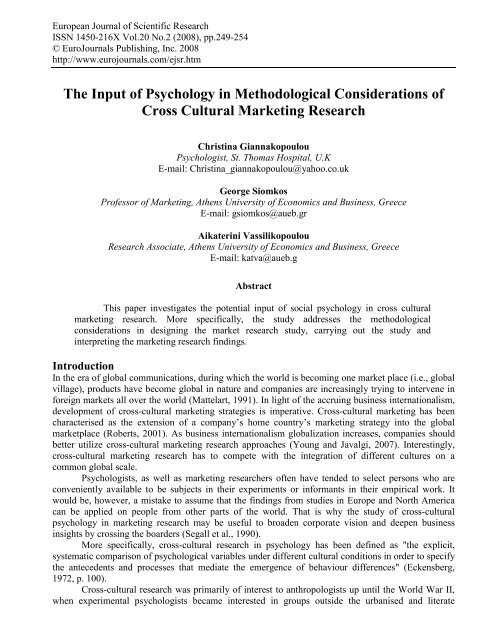European Journal of Scientific Research - EuroJournals
European Journal of Scientific Research - EuroJournals
European Journal of Scientific Research - EuroJournals
You also want an ePaper? Increase the reach of your titles
YUMPU automatically turns print PDFs into web optimized ePapers that Google loves.
<strong>European</strong> <strong>Journal</strong> <strong>of</strong> <strong>Scientific</strong> <strong>Research</strong><br />
ISSN 1450-216X Vol.20 No.2 (2008), pp.249-254<br />
© Euro<strong>Journal</strong>s Publishing, Inc. 2008<br />
http://www.eurojournals.com/ejsr.htm<br />
The Input <strong>of</strong> Psychology in Methodological Considerations <strong>of</strong><br />
Cross Cultural Marketing <strong>Research</strong><br />
Christina Giannakopoulou<br />
Psychologist, St. Thomas Hospital, U.K<br />
E-mail: Christina_giannakopoulou@yahoo.co.uk<br />
George Siomkos<br />
Pr<strong>of</strong>essor <strong>of</strong> Marketing, Athens University <strong>of</strong> Economics and Business, Greece<br />
E-mail: gsiomkos@aueb.gr<br />
Aikaterini Vassilikopoulou<br />
<strong>Research</strong> Associate, Athens University <strong>of</strong> Economics and Business, Greece<br />
E-mail: katva@aueb.g<br />
Abstract<br />
This paper investigates the potential input <strong>of</strong> social psychology in cross cultural<br />
marketing research. More specifically, the study addresses the methodological<br />
considerations in designing the market research study, carrying out the study and<br />
interpreting the marketing research findings.<br />
Introduction<br />
In the era <strong>of</strong> global communications, during which the world is becoming one market place (i.e., global<br />
village), products have become global in nature and companies are increasingly trying to intervene in<br />
foreign markets all over the world (Mattelart, 1991). In light <strong>of</strong> the accruing business internationalism,<br />
development <strong>of</strong> cross-cultural marketing strategies is imperative. Cross-cultural marketing has been<br />
characterised as the extension <strong>of</strong> a company’s home country’s marketing strategy into the global<br />
marketplace (Roberts, 2001). As business internationalism globalization increases, companies should<br />
better utilize cross-cultural marketing research approaches (Young and Javalgi, 2007). Interestingly,<br />
cross-cultural marketing research has to compete with the integration <strong>of</strong> different cultures on a<br />
common global scale.<br />
Psychologists, as well as marketing researchers <strong>of</strong>ten have tended to select persons who are<br />
conveniently available to be subjects in their experiments or informants in their empirical work. It<br />
would be, however, a mistake to assume that the findings from studies in Europe and North America<br />
can be applied on people from other parts <strong>of</strong> the world. That is why the study <strong>of</strong> cross-cultural<br />
psychology in marketing research may be useful to broaden corporate vision and deepen business<br />
insights by crossing the boarders (Segall et al., 1990).<br />
More specifically, cross-cultural research in psychology has been defined as "the explicit,<br />
systematic comparison <strong>of</strong> psychological variables under different cultural conditions in order to specify<br />
the antecedents and processes that mediate the emergence <strong>of</strong> behaviour differences" (Eckensberg,<br />
1972, p. 100).<br />
Cross-cultural research was primarily <strong>of</strong> interest to anthropologists up until the World War II,<br />
when experimental psychologists became interested in groups outside the urbanised and literate

















